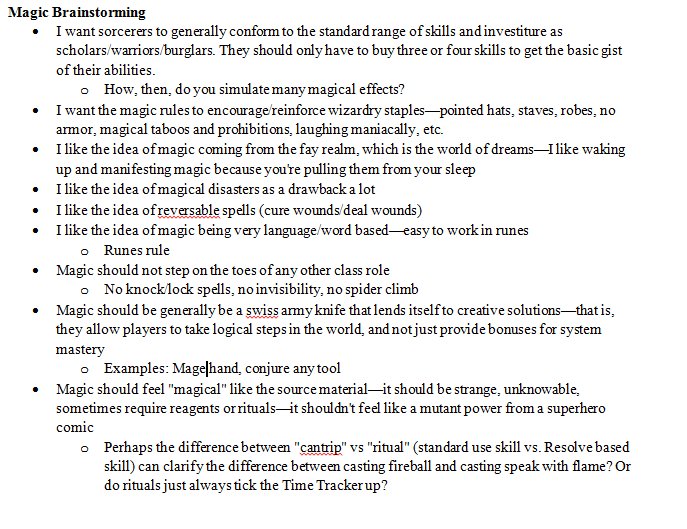This is a continuation of my review of Gradient Descent, the horror sci-fi megadungeon for Mothership. Part 1 can be found here.
This review covers my experiences running Gradient Descent as a one-shot. As such, it is spoiler heavy. Avoid this review if you plan on enjoying this module in a way outside that of a snooty critic.
--
The module claims to be about "what it means to be human." When I was prepping this game, I wondered what this meant exactly.
Does it mean that the PCs can have meaningful roleplaying moments as they uncover infiltrator androids? Does it mean that PCs will ask themselves if they are secretly androids? Does it mean they will turn against each other? Does it mean they will be kind to the androids they encounter?
Does the module do any of that, or was that just a snappy claim?
This is the crux of this review.
Prepping the one shot
We had never played Mothership before. We had a session 0 to make characters, and it was a fucking delight. The character sheet is a work of genius. Look at it. The character sheet teaches you how to make your character. It answers questions before you can ask them.
We also went over my basic safety tools and talked about our expectations for horror games.
> The "patches" of Mothership is probably the biggest stroke of genius in any game. Roll d100 and gain a random patch on your coveralls. No mechanical benefit, but goddamn if it doesn't drip flavor. It's beautiful.
The setup for the one shot was thus: The Company offered to terminate the PC's indefinite contract if they could get [random artifact] from [random location].
- I tried rolling a few times for the random artifacts but kept getting disappointing answers ("marbles of an unknown substance"). These might have felt cool in an abstract way, but since this was a one shot I wanted an artifact that would w-o-w the players, so I eventually just chose the one that seemed coolest to me (a disc drive with economic predictions for the next decade).
- For random location, I got "The Garden" on Level 2. This felt like a good target for a one shot.
Since Gradient Descent is a megadungeon and we were still wrapping our heads around the rules, my players agreed that the spaceship rules weren't important for this one shot. As such, we decided to handwave any spaceship content. I cut the blockade and the Bell from our session. The players were to go in, get the goods, and get out.
Play report, in brief
- The PCs are told that they must get an anomalous disc drive from "the Garden" in the failed AI factory of the Deep.
- The PCs arrive on the satellite.
- We establish a procedure to determine if an environment past an airlock door is pressurized and has atmo.
- The PCs jury rig the reception terminal and access the shared calendar. They learn of the existence of something called "The Exhibit Hall" and make some educated guesses.
- The PCs carefully sniff around the first floor, encountering a Diver (Arkady, from the Bell) who gives them the basic rundown of MONARCH. Everybody gets itchy from the Bends.
- The PCs find one of the checkpoint terminals and retreat from turret gun.
- The PCs go to Floor 2.
- The PCs are sad and scared, weeping as they look upon the pseudoflesh shrine.
- The PCs encounter the Chosen.
- The PCs step backwards and close the door. They fail to jam it.
- The Chosen open the door.
- The Chosen invite them to meet the Chosen King.
- The PCs weep and gnash their teeth as they see the pillars of flesh weeping pseudomilk.
- The Chosen King confirms that the exhibit hall is the Garden, and does not actively stop the PCs from searching there for the artifact they seek.
- He does, however, report this activity to MONARCH.
- MONARCH sends 4 security androids to investigate.
- The PCs find the disc drive hidden in a cache in the pillars of flesh of the Garden.
- The security droids move into the room.
- A shootout occurs.
- After disabling the security androids, the PCs go back to Floor 1.
- During the long elevator ride, MONARCH comes across the radio, asking them to work for him.
- He promises to send infiltrator androids to fill the rest of their contract. He promises fabulous wealth.
- When they refuse, he agrees that it matters little, since "one of my children will be leaving with you anyway."
- Everybody is sad. +Bends.
- The PCs get on their ship and blast off. Mission accomplished.
(Secret possible ending: The doctor, being extremely paranoid about MONARCH's parting sentiments, kills the rest of the crew after they enter stasis. We agreed it happened outside of canon since "play" had stopped.)
Impressions
Usability at the Table
I had several copies of Gradient Descent open at once.
- One was centered on the map key (since I could not keep the icons in my head).
- One was centered on the enemy stats.
- One was focused on the PC's current room.
This was easier than jumping up and down in the text, and is one of the advantages of PDFs.
As I mentioned in Part 1, I desperately wished I had some of the art and the map in a spoiler free format. This would have been a big add at the table. As it was, only I got to appreciate this content.
I had been concerned that it would be hard to track MONARCH's Stress levels and responses, but it wasn't really. When these events happened, it felt meaningful and obvious--not tedious or subtle.
Random Encounters
The PCs explored two floors of the Deep. Each floor was compelling and tense, with subject material that gave the players visceral reactions.
Random encounters are needed to break up the monotony of otherwise empty rooms. Random encounters allow both the GM and the players to be surprised by the flow of the game. In Gradient Descent, the GM rolls a d100 once for a human sized room and thrice for a factory sized room. If the GM rolls a double, a random encounter occurs. If the doubles were low, the encounter is friendly (or at least not overtly hostile). If the doubles are high, the encounter is hostile.
In theory, I like how these rules "sound." In practice, over our five hours, I did not roll a random encounter. As such, my fears about having too few encounters were certainly unfounded.
Panic, Stress, and the Bends
Similarly, given the somewhat limited time frame of our one shot, characters accumulated Panic and the Bends, but only minor bumps came from it. The tension was building over the one shot, but never quite popped.
Combat
Combat was perhaps the least tense and most boring part of the encounter. This was possibly since we were all still learning the rules. Your mileage may vary.
- Several players had not come equipped for combat. They hid behind cover the entire time.
- One player could not roll a success. They were obviously frustrated as they failed every single one of their initiative and to-hit rolls.
- The factory sized room that we were fighting in made the PCs think it was too big to escape from. "How can we run out? It takes about 30 minutes to cross?"
- The factory sized room had one or two points of interest with which to interact, but nothing dramatic or charged. They had plenty of cover, but nothing dynamic to change the combat.
How did these answer the question of "What it means to be human?"
The Bends mechanic was interesting, but did not pay off in a 5 hour game. As a megadungeon, this is probably not surprising.
Gradient Descent is minimalist. This is both a pro and a con. In some ways, it felt like I was given a lot of really rare ingredients but not a recipe. I wondered if I was combining them in the right way.
Silent Titans spent several pages making sure you could actually use the "pretentious artpunk trash" that it presented. There were some solid essays in the first few pages of that book. The game was ridiculous, but I also felt equipped while running it. Not so much with (the more grounded) Gradient Descent.
This might not be Gradient Descent's fault as much as the one-shot format. Maybe it's designed for a slow burn, not a quick pop.
Final Verdict
Does Gradient Descent deliver its promise that it explores what it means to be human? I'm not sure. It didn't for me, at least.
Do I recommend it? Yes. This thing is honestly just full of cool ideas. Weird ideas. Upsetting ideas. It threads a good line between "scary" and "usable."
I think six months of play will reveal a very different experience than a one shot. I keep wondering "What if..." and wanting to go back into that. So it's definitely captured my imagination.








